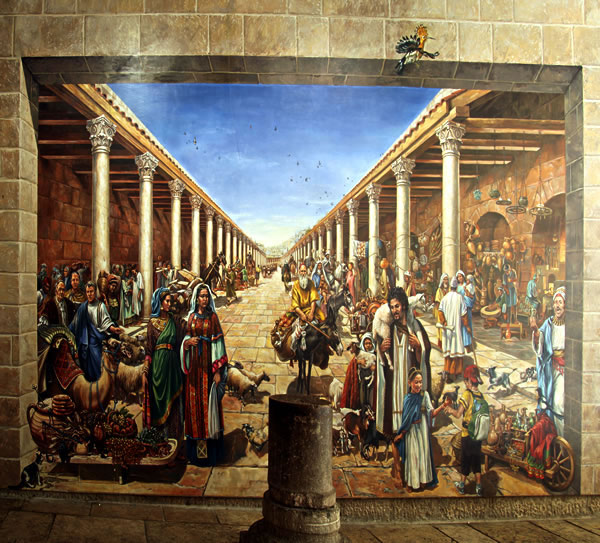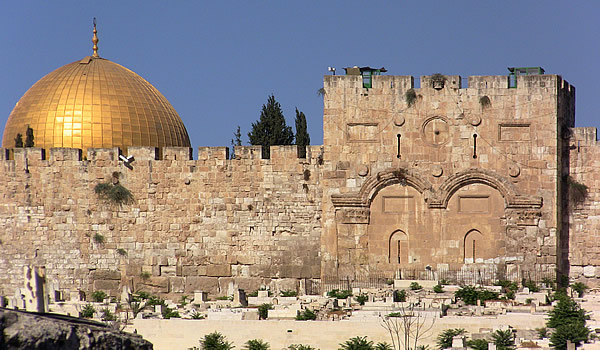Jesus Sitting: Its Four Aspects In Hebrews
|
Introduction
 |
|
Painting of Jerusalem’s main street (Cardo street, Cardo is Greek for heart) about 500AD
|
In the tabernacle or temple, there were no chairs upon which a priest could sit to rest. Instead, when the priests ministered daily in the tabernacle or temple, they had to stand.
The reason for the absence of a chair was that their priestly tasks were never completed, because their sacrifices could never take away sin. In contrast, the book of Hebrews mentions four different aspects in which Jesus is seated because of His supremacy over the Old Testament order.
Day after day every priest stands and performs his religious duties; again and again he offers the same sacrifices, which can never take away sins. Hebrews 10: 11.
His Person
In the first chapter of Hebrews, the human writer and his audience are passed over. Instead, God is presented immediately in the person of His Son who is the Creator and Sustainer and who is superior to every created being, including the Old Testament prophets and angels.
In the past God spoke to our ancestors through the prophets at many times and in various ways, but in these last days he has spoken to us by his Son, whom he appointed heir of all things, and through whom also he made the universe. The Son is the radiance of God’s glory and the exact representation of his being, sustaining all things by his powerful word. After he had provided purification for sins, he sat down at the right hand of the Majesty in heaven. So he became as much superior to the angels as the name he has inherited is superior to theirs. Hebrews 1: 1-4.
In these verses the emphasis is upon the person of the Son and what He has accomplished. It gives seven different reasons for the superiority of the Son.
- Appointed heir of all things
- Made the universe
- Radiates God’s glory
- Is the exact representation of God’s being
- Sustains all things
- Provided purification for sins
- Seated at the right hand of the Majesty in heaven
Literally, it is God in Son (ἐν υἱῷ) who has spoken in these last days. This is seen in Darby’s translation and in the footnote of the New American Standard Bible. God in the form of Son is the greatest person who could ever appear to speak to us in human form. Before there were prophets, priests, and kings, but now at the end of the age God in the Son has come into the world to speak to us. The divine Son now sits because there is no one greater who could come after Him to give us a further revelation of the divine will.
in these last days has spoken to us in His Son, 1 Hebrews 1:2 (NASB)
at the end of these days has spoken to us in [the person of the] Son, Hebrews 1:2 (Darby translation)
His Priesthood
The Levitical priests stood daily ministering in an earthly tabernacle and in an earthly temple. Their priestly service was never finished, and they had to repeat continually their ceremonial duties. However, as our great high priest, Jesus is now serving in heaven in the true tabernacle not make with human hands. So, because of the perfection of his priesthood, He is seated at the right hand of the throne of the Majesty in heaven.
Now the main point of what we are saying is this: We do have such a high priest, who sat down at the right hand of the throne of the Majesty in heaven, and who serves in the sanctuary, the true tabernacle set up by the Lord, not by a mere human being. Hebrews 8: 1-2.
His Sacrifice
Here the emphasis is upon the sacrifices that the priests offered repetitiously. In contrast to the Levitical sacrifices, the sacrifice of the Savior upon the cross will never have to be repeated. Because of the perfection of His sacrifice, the Son has the right to sit down forever at the right hand of God.
Day after day every priest stands and performs his religious duties; again and again he offers the same sacrifices, which can never take away sins. But when this priest had offered for all time one sacrifice for sins, he sat down at the right hand of God, and since that time he waits for his enemies to be made his footstool. Hebrews 10: 11-13.
His Race
Life is a marathon race in which we need to persevere and to focus upon the eternal goal before us. Jesus ran the race too and completed it perfectly. As a result, he no longer runs, but he is seated at the right hand of the throne of God. He is our model for perseverance in running life’s race.
 |
|
Eastern Gate (Ezekiel 44:1-2, Psalm 24:7-10) or Golden Gate with Muslim graves before the gate with top of the Dome of the Rock in the background.
|
Therefore, since we are surrounded by such a great cloud of witnesses, let us throw off everything that hinders and the sin that so easily entangles. And let us run with perseverance the race marked out for us, fixing our eyes on Jesus, the pioneer and perfecter of faith. For the joy set before him he endured the cross, scorning its shame, and sat down at the right hand of the throne of God. Hebrews 12: 1-2.
Of course, we should throw off any sin that prevents us from running a good race. However, there are things that may hinder us in the race and may be even good considered in themself. Yet they slow us down. The Apostle Paul is an excellent example of one who ran life’s race to the glory of God.
I have fought the good fight, I have finished the race, I have kept the faith. 2 Timothy 4:7 (NIV)
It is worth noting the distinction between the words enduring the cross and scorning the shame in Hebrews 12:2. Enduring the cross is in relationship to God and the atonement sufferings that were necessary to pay the penalty for our sins upon Calvary’s cross. Jesus endured, not scorned, the wrath of God to make atonement for our sins. Thankfully, when we are redeemed, we will never have to endure God’s wrath.
In contrast, scorning the shame is in relationship to Christ’s sufferings from the hand of man. The scourging, mocking, carrying the cross, mock trial, crown of thorns, spitting, and the nails were all martyr sufferings that mankind cruelly heaped upon Him. These martyr sufferings of Christ did not atone for our sins. They were just the contempt and the hatred that sinners had for Christ. Redemption occurred when Christ suffered the wrath of God alone during the three hours of darkness and when His precious blood was shed. He must endure the infinite weight of them. He could not scorn the sufferings for our sins, but He could scorn the shame of the evil words and the physical sufferings that the angry mob inflicted against Him.
1 Literally, in Son; or in the person of a Son.











